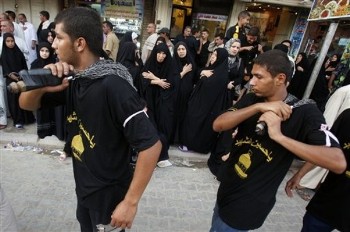Sudanese clerics praise government’s decision to shut down Iranian cultural centre
September 5, 2014 (KHARTOUM) – Sudanese clerics at their weekly Friday sermons lauded the government for its decision this week to close the Iranian cultural center in Khartoum, urging it to take further action against Shiites in the country.

He added that these centers sought to spread these ideas in Sudan.
Bashir said that the Shiites wanted to make a breakthrough in the Sudanese society adding that the national security of Sudan and the Arabs is strategic and must be maintained.
The former presidential adviser disclosed that additional steps will follow including the confiscation of books and publications that promote the Shiite doctrine, whether in public libraries or in private.
He reiterated that authorities will conduct a review of Shiite-oriented private schools such as Fatima al-Zahra School and the Institute of Imam Ja’afar al-Sadiq.
“All private schools that do not adhere to the approach adopted by the state will be closed,” Bashir added.
He added that they will draft a text to judicial bodies proposing the enactment of a law that criminalises and punishes anyone who insults Prophet Mohamed’s companions or his wives. The Islamist figure also vowed to conduct a dialogue with those who were “tricked” and converted to the Shiite faith in Sudan.
Meanwhile, hardline cleric Abdul-Hai Youssef said in his sermon on Friday that they have long warned about the Shiite expansion in Sudan.
“But there are those who thought that the dispute with them is like that of the schools of Islamic jurisprudence among themselves, and there were those who were deceived under the pretext of unity and convergence,” he said.
The first Iranian cultural centre in Sudan was inaugurated in 1988 during the era of the former prime minister, al-Sadiq al-Mahdi, but the Shiite tide has grown rapidly during the current rule of Bashir, particularly in light of its improved ties with Iran.
The foreign ministry spokesperson, Youssef al-Kordofani, said in statements carried by state media on Tuesday that the government continued to monitor the center’s activities and stressed that it had exceeded its mandate and posed a threat to the intellectual and social security in Sudan.
The Sudanese diplomat also confirmed that the Iranian charge d’affaires was summoned on Monday and informed of the decision and their request that the Iranian cultural attaché and the staff at the center leave the country within 72 hours.
Sudan’s foreign minister, Ali Karti, told the London-based Asharq al-Awsat newspaper on Wednesday that the Sudanese presidency had rejected a request from Iran to reverse its decision to close the centre.
Ismail al-Mahi, the head of the Sudanese Salafist group Ansar al-Sunna, also commended the government, nderscoring that Shiites have a different religion and are sceptical about the Holy Koran and the Sunna the prophet.
He pointed out that Shiites are seeking to impose their doctrine by force, citing a statement by the commander of the Iranian Revolutionary Guard on Tehran’s readiness for war against the Arabs.
(ST)
